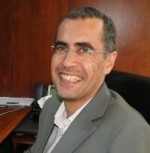CTO, Zain, Jordan: “Monetising data networks has become more challenging”
Yousef Mutawe, CTO, Zain, Jordan, is delivering a keynote on Day One of the LTE MENA conference, taking place on 13th-14th May 2013 at the JW Marriott Marquis, Dubai. Ahead of the show we speak to him about the challenge of meeting the data demands of Zain’s customers.
March 18, 2013


Yousef Abu Mutawe, Cto, Zain
Yousef Mutawe, CTO, Zain, Jordan, is delivering a keynote on Day One of the LTE MENA conference, taking place on 13th-14th May 2013 at the JW Marriott Marquis, Dubai. Ahead of the show we speak to him about the challenge of meeting the data demands of Zain’s customers.
What major developments have there been with regards to the LTE industry in your region this past year?
The increased adoption of an internet life-style combined with the immaturity of fixed and wireless broadband networks in the region makes it challenging for the operators to fulfil the increasing demand for bandwidth. In the past few years fixed and wireless broadband has become extremely demanding in terms of infrastructure and spectrum. HSPA+ created the appetite, but it no longer can sustain and support the increased demand for throughput. Just two years after launching HSPA in Jordan the need for more bandwidth became apparent and in response to this the regulator tendered 1800MHz and 2.6GHz as possible frequency bands for LTE. Some trials are currently taking place at 1.8GHz.
What are the chief challenges you are facing?
Meeting the demand for data is one challenge. The other big challenge is justifying the massive investment needed in RAN and TX infrastructure. With the drop in prices and the cannibalisation of international and roaming revenues into the [OTT] data network, monetising data networks has become more challenging. Additionally, regulators are not easing the cost of introducing new technologies due to the high cost of spectrum.
The LTE MENA conference is taking place on the 13th-14th May 2013 at the JW Marriott Marquis, Dubai. Click here to find out more about the event.
What are the key techniques for network optimisation in LTE and what effect can it have on the customer experience?
Deployment and optimisation of data wireless networks is a very complicated and challenging engineering task that requires a comprehensive systematic approach. As such, the need to have software tools and optimisation algorithms becomes a necessity for wireless networks. The self-organising capability of a wireless network is a key feature required to achieve optimal system capacity and service coverage, in order to deliver a better user experience.
Do you believe that RCS services can help the industry compete with OTT?
I don’t believe that RCS is the way forward to compete with OTT. On the contrary, the OTT market has exploded and RCS could become a burden and a cost and expense hog rather being an effective tool to fight against OTT applications. The OTT market is an open market with a variety of flavours that increases and changes at every moment. We as operators don’t need to copy or to compete with OTT applications. Rather we should work smartly to find out how to monetise what’s in the cloud. If we price it well and fill it well we can find satisfaction in being a data pipe.
Pricing for LTE is a controversial subject. Are operators getting it right?
When it comes to correctly pricing wireless internet operators invariably fail. Operators always think of volume and forget the most important dimensions of data networks, which are speed and quality. Moreover, some operators fail to factor in the cost elements into the pricing equation correctly.
Read more about:
DiscussionAbout the Author(s)
You May Also Like











_1.jpg?width=300&auto=webp&quality=80&disable=upscale)


.png?width=800&auto=webp&quality=80&disable=upscale)